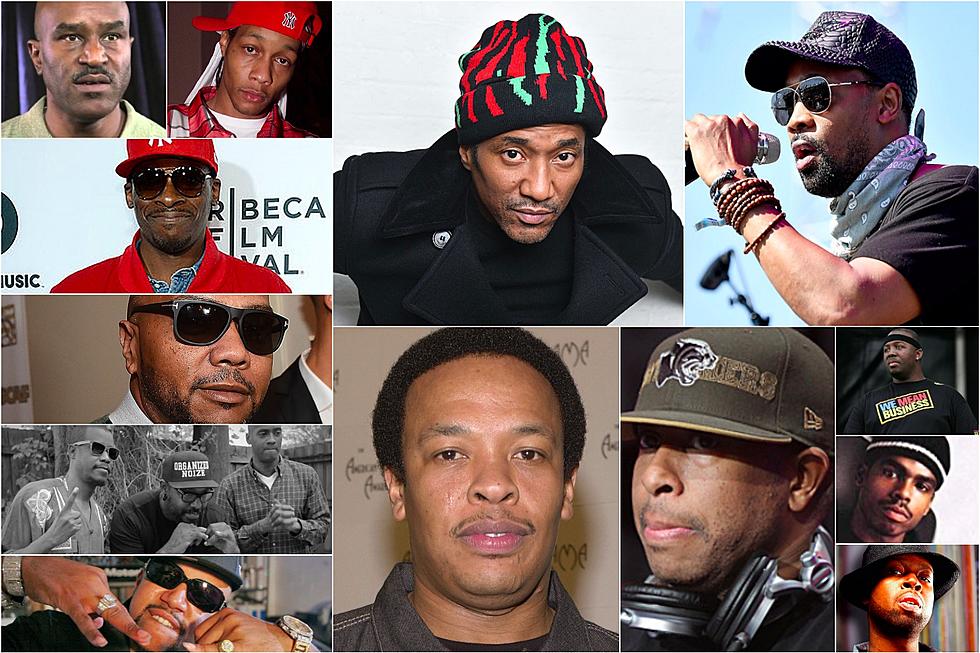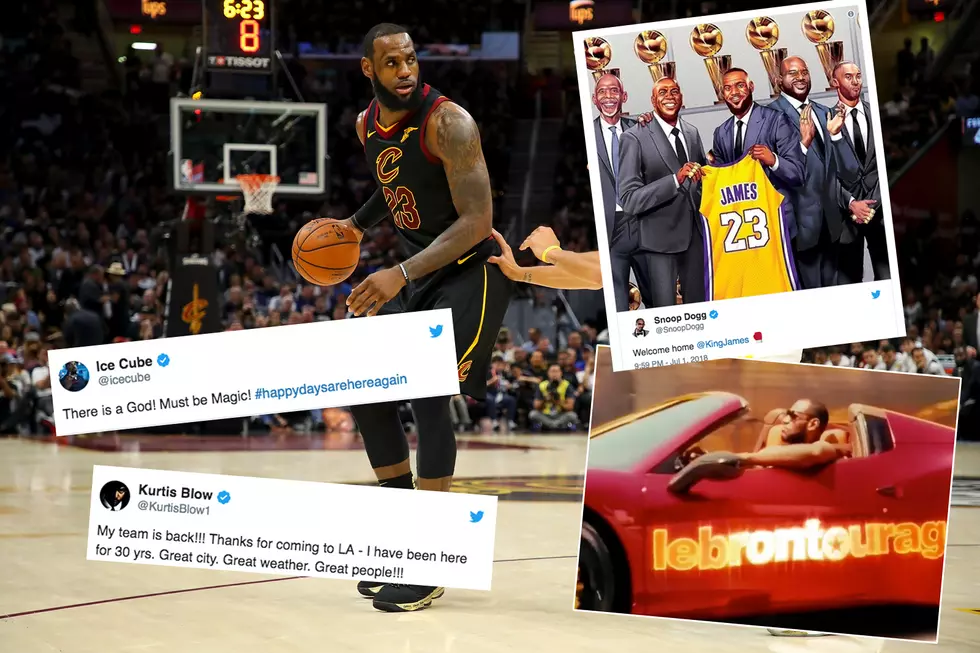
25 Years Later: Gang Starr’s ‘Daily Operation’ Forged a Path for Hardcore Individuality
In the early 1990s, the sound that would become a cornerstone of hardcore East Coast hip-hop for the remainder of the decade was forged on a string of classic albums from Gang Starr. DJ Premier and Guru fully came into their own on 1991s Step In the Arena, a classic album that showcased Premier's distinctive, sample-heavy sound and Guru's topical perspective.
That album would be Gang Starr's first widely-acclaimed release, even as things were beginning to change within hip-hop. West Coast artists like Ice Cube and 2Pac had gained significant visibility and Dr. Dre's Chronic was around the corner. The established guard of top-tier emcees like Rakim and Kool G Rap would release successful albums in 1992 (Don't Sweat the Technique and Live and Let Die, respectively), Public Enemy and N.W.A. were experiencing their last stretches of mainstream viability and left-of-center hip-hop acts like A Tribe Called Quest and De La Soul were peaking. The dark storytelling of southern rap acts like the Geto Boys was also beginning to break rap's bicoastal grip. And pop rap acts like Heavy D, Sir Mix-A-Lot and Salt-N-Pepa were charting big with infectious, if sometimes lightweight, crossover hits.
It was into that diverse array of sounds and styles that Gang Starr had forged an identity that was unapologetically underground. EPMD had tread similar ground beginning with 1988s Strictly Business, but Primo and Guru met somewhere between the recognizable loops of that Long Island duo and the jazzy inflections of A Tribe Called Quest. Born Christopher Martin, DJ Premier's ear for samples was unique--even in a period teeming with loop masters like Tribe's Q-Tip and soon-to-be household name Pete Rock. Jazz had been part of Gang Starr's repertoire from the moment Boston native Keith Elam aka "Guru" joined forces with Preem, a music nerd from Houston, TX who'd originally called himself Waxmaster C and decided to take up Guru's offer after he was asked to be a part of Gang Starr, which had been around in underground circles since 1986.
"I didn’t really want to be in Gang Starr," Primo revealed in a 2010 interview with XXL. "I just wanted to be a guy who made beats. I wanted to work with Gang Starr, though, so when Guru gave me that chance, I didn’t want to sign. I got a lawyer and he was like, ‘You’re signing your life away if you sign this deal.’ But I wanted to make a record so bad so I signed it." The duo released No More Mr. Nice Guy in 1989, and the album underperformed despite strong buzz for singles "Words I Manifest" and "Positivity." The track "Jazz Music" got the attention of director Spike Lee, who would recruit the duo for the soundtrack to his 1991 film Mo' Better Blues. But Gang Starr had to get away from their label. "We found a real good lawyer, who is still the Gang Starr lawyer, and he got us out of that contract with Wild Pitch [Records]," Primo shared. "We never dissolved our contract. We are still signed as Gang Starr."
After departing Wild Pitch for Chrysalis, Gang Starr seemed to settle into themselves. Step In the Arena was released in January of 1991 and announced Premier and Guru as the cutting edge of East Coast hardcore rap; making little-to-no concessions to mainstream tastes and embracing an ethos informed by spiritual consciousness and a devotion to hip-hop's tradition and connecting it to the legacy of Black music overall--especially jazz.
"[DJ] Premier’s grandfather used to be in a jazz band," Guru explained to Adisa Banjoko in 1991. "When he was first getting into rap, he used to tell him, 'Yo, it’s the same thing. It’s just another expression of the street.' With me, my godfather was a heavy jazz buff. He was a hi-fi fanatic. He would buy the top of the line, Carver stuff. If I was with my friends and I needed some money or something, I’d pass by his house. He’d grab the whole posse and say, 'Sit down and listen.' He’d sit us in between two big ass speakers, as tall as the next man. It would sound like you could hear every instrument."
Step In the Arena put Gang Starr at the forefront of the emerging 1990s wave--and Gang Starr had to follow it with something as strong or better. In the almost 18 months since ...Arena, A Tribe Called Quest's The Low End Theory had pushed the parameters of jazz and hip-hop intersections. Gang Starr would repurpose their own approach to jazz-drenched hip-hop beats, and their new album would feature an even more pronounced connection between the two musical worlds.
"The Place We Dwell" opens with a sample of Roy McCurdy's distinctive drum break from "Fun" by the Cannonball Adderley Quintet; a pointed connection between Gang Starr and their jazz heritage. Over the looped drums, Guru's words are a love letter to the borough of Brooklyn, a place the Roxbury-born emcee had come to know as his adopted home. "Flip the Script" evokes a live club feel via a clever Grover Washington sample, with Guru in full traditional battle rap mode, dismissing sucker emcees and championing his mic skills.
"Ex Girl to the Next Girl" is an obvious quasi-sequel to Step In the Arena's "Lovesick," with Guru once again addressing love gone wrong. Rappers had addressed relationship troubles, but so many hip-hop records about love were either pandering or glaringly scornful; Guru managed to write about love gone bad without wallowing in the kind of "bitches ain't shit" ethos that was coming so easy to many of his contemporaries. With Primo flipping Caesar Frazier's "Funk It Up," (and throwing in some Boogie Down Productions for good measure), Guru doesn't entirely sidestep misogyny ("Never chasin' a skirt") he makes it plain that he saw this sour relationship coming. And he's happy now with his new girl. Love wins, after all.
"Soliloquy of Chaos" mines the sort of sonic territory that would become a hallmark of Wu-Tang Clan releases within just a year or two of Daily Operation's release. With strings and keys lifted from Ahmad Jamal's "Misdemeanor," Primo gives Guru an almost elegant backdrop to weave stories about how a dope night out can be ruined by violence when an altercation at a show turns deadly.
"After that 5-0 came and turned the party out/Then an ambulance came to take the body out/And we didn't even get all the equipment out/And we didn't even get to turn the place out/This can happen often and it's really fucked up/So I'll ask you to your face, homeboy what's up? Did you come to see my show or to the stupid nigga playoffs?"
"I'm the Man" provided a showcase for two Gang Starr affiliates who would soon go on to greater fame: Lil Dap and, most notably, Jeru the Damaja. Lil Dap would later join with Bronx rapper Melachi the Nutcracker to form Group Home, and Jeru would go on to become one of the most respected underground emcees of the 1990s. Here, Jeru is the standout for good reason--providing an early indicator of how well his rhymes mesh with production from DJ Premier.
One of Daily Operation's standout moments is the hardcore anthem "Take It Personal." With the aggressive opening drums from the Skull Snaps' underrated soul cut "It's a New Day," and a slick piano left from "I Can See Clearly Now," Primo crafted an ominous bit of 90s boom-bap that he'd been sitting on for years prior to recording the actual song.
“I had that ['Take It Personal'] beat for a long time and we just started on the Daily Operation album and Guru used to be like, "you play that beat every day,'” Premier shared in 2012. "We were roommates from 88-93 so we used to be around each other way before the vocals were cut for the beats."
A sense of defensiveness runs throughout Daily Operation, as Guru reacts to his newfound fame and reputation as a topical emcee. While forged in the tradition of Chuck D and similar territory as KRS-One, Guru never wanted to be seen as anything more than an everyman from the neighborhood, just trying to kick some knowledge to his brothers.
"Since I did '[Words I] Manifest,' everybody was asking me if I was Five Percent [Nation of Gods and Earths] like groups like Brand Nubian, Rakim, King Sun, Poor Righteous Teachers," Guru said in 1991. "I love what all them brothas are doing. But I’ll put it to you like this: A lot of my boys are [Five Percenters], I know a lot of people that are. But I do not practice that doctrine."
Guru makes it plain on "2 Deep," addressing speculation about his religious beliefs: "Don't ask me if I'm Muslim don't say nothin' to me/I said I was raised like one, son--I had two cousins/They pushed me to find myself or else they knew I wasn't/Gonna make it and then end up a statistic/My life was twisted I almost missed it."
"No Shame In My Game" was a smoothed-out affair; carried by a sample of The Crusaders "Middle of the River." And the track featured Guru addressing the ideas that fans had developed about him as a "conscious rapper:"
"Motherfuckers always want to know what makes me tick/I`ll pull a phrase out quick 'cause I`m dipped and I`m slick/You thought that I would slip 'cause you seen me drinking forties/It shocked you then you told your friends you saw me/Well say what you want 'cause all of mine is in tact."
"Conspiracy" is one of the album's most explicitly political tracks, as Guru raps about the barriers put in place to disrupt and distort Black lives and the perception of Black people. "You can't tell me life was meant to be like this--a black man in a world dominated by whiteness," he opines, before outlining how many ways Black minds are sabotaged. Guru takes aim at everything from the SATs to the media to the rap game to try and illustrate the odds that Black people are facing daily.
"The Illest Brother" starts off as another boast-filled tribute to his mic skills, but Guru's rhymes soon shift focus to unnecessary violence. The song turns into a cautionary tale and Primo's beat melds perfectly with the subject matter; he once again samples Ahmad Jamal (this time, it's 1973s "Ghetto Child") and it amplifies the jazzy feel of the album with uniquely off-kilter looping.
The hip-hop industry itself is the target of "Hardcore Composer," with Guru criticizing posers as gangsta rap was beginning to become fashionable. The rhymer also exposes industry suits who think they know the music and attempt to water down the sound. With Premier melding Paul Nero, Marva Whitney and the Jungle Brothers over the 1,327th sample of James Brown's "Funky Drummer," it's another deliciously jazzy moment on an album that never struggles to find them. A point even more amplified on "B.Y.S.," with Guru in supreme shit-talker mode ("Imma bust yo shit") and backed by looped piano from "I Got Some" by Sugar Billy Garner.
The album's hardcore devotion is more than just a sonic approach, Gang Starr wore the idea like a mantra. And Guru explained that he wanted the industry to take note of how to market the kind of music Gang Starr had become known for.
"Firstly, I think that some of the majors need to learn from the skills of the independents as far as marketing street rap," Guru told Billy Jam in 1991. "The majors will have the budgets but they won't have the techniques for street marketing and if you can't get radio play then you gotta do stuff differently. I think that a lot of the West Coast rappers are gaining from those skills and I think that a lot of the East Coast record companies need to get with that flow."
"Take Two and Pass" is the most laid-back moment on the album--and for good reason. With Guru dedicating the song to the joys of smoking weed, the chill groove sets the vibe and Guru's rhymes set the stage. "We got at least five heads so I rolled a white owl/It's the break of dawn and we're awake like night owls/Phillies are cool but they burn much quicker/Hey yo, come on pass that shit nigga." This ode to "letting the la-la enhance our minds" was another indicator that Guru thought himself, first and foremost, as one of the crew. Even as he was trying to lift consciousness.
"Stay Tuned" was an appropriate closer for the album, as Gang Starr had firmly established themselves and for fans, it seemed obvious that more greatness was to come. One notable track that didn't make it onto Daily Operation was the infectious "DYWCK," a lighthearted song that featured duo Nice & Smooth. The song was popular among hip-hop heads, but wouldn't make it onto a Gang Starr album until 1994s Hard To Earn.
“It was supposed to be on Daily Operation, but the label wasn’t rolling with it," Premier would tell Complex in 2011. "They just wanted to leave it the way it was. The buzz, however, was so big, we re-mastered it and tacked it onto the album, but then [the label] just didn’t do the re-pressings. I think we would’ve gone, maybe, even platinum. ‘DYWCK’ was that big. We were upset, so we said, ‘Let’s at least put it somewhere down the line because even if they don’t want anything on the album, if they want ‘DWYCK’ on it, they’ll cop’em.’ So that’s why we put that on Hard to Earn.”
Released on May 5, 1992, Gang Starr's Daily Operation would cement their status as the pinnacle of no filters, hardcore East Coast hip-hop. After it's success, DJ Premier would go on to more success as one of the most in-demand producers in hip-hop; working with everyone from Nas to the Notorious B.I.G. In 1993, Guru would delve further into jazz/rap connections with the first of his acclaimed series, Guru's Jazzmatazz, Vol. 1. That project would feature the rapper collaborating with luminaries such as Donald Byrd, Branford Marsalis and N'Dea Davenport.
Gang Starr would release more acclaimed albums throughout the 1990s, but the relationship between Guru and Primo would eventually sour and the two would become estranged in the 2000s. Guru's shocking 2010 death after a battle with cancer closed the door on Gang Starr as an active group, but the legacy that they forged is epitomized on Daily Operation: a spirit of individuality, forged in tradition but never deferring to anyone's idea of what hip-hop has to be. Guru and Premier earned their respect the old fashioned way.
"The Gang Starr legacy is forever, period," Primo said in 2010, shortly after Guru's passing. "It will never go away. We’ve been crowned icons. We’ve been crowned legends. From Jam Master Jay to Jay-Z to Rakim to Melle Mel to Marley Marl. Every idol that I’ve wanted to like what we were doing, has called us legends. I’m good. And the music never dies."
Watch Gang Starr's Video For "Take It Personal"
Watch Gang Starr's Video For "Ex Girl To the Next Girl"
More From TheBoombox









